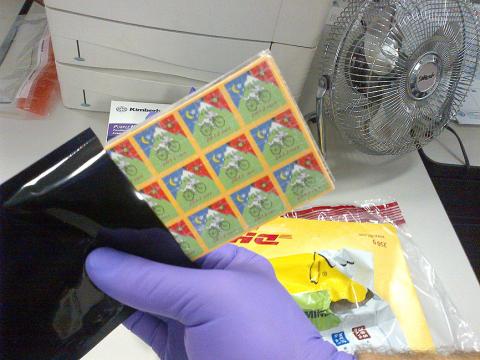Four men were indicted on Wednesday for trafficking drug-laced squares of paper disguised as postal stamps to the US and South Africa using an express air service.
Prosecutors said the suspected mastermind behind the operation was Kung Ling-hau (孔令豪), 51, with Lin Hsin-cheng (林鑫政), who has a degree in chemical engineering, as his main accomplice.
Kung and Lin began manufacturing two “designer drugs” — MDPBP (a stimulant discovered in the 1960s) and 25B-NBOME (a psychedelic discovered in 2004) — in July last year in a laboratory at Kung’s company in Greater Taichung, prosecutors said.

Photo: Yang Cheng-chun, Taipei Times
The accused soaked stamp-like squares of paper with MDPBP and 25B-NBOME, which were then dried and sold, prosecutors said.
Users place the stamps in their mouth to get high. Prosecutors said such papers are quite popular in dance clubs and bars.
Kung owns a security guard service company, prosecutors said, while Lin made use of his chemical engineering know-how to access information from US Web sites on developing new recreational drugs.
According to the indictment, Lin has a record of arrests for selling illegal magic mushrooms and “yohimbe bark extract,” known as the Viagra of herbal plants, to entertainers in Taipei and to wealthy people in the high-tech industry in the Hsinchu area.
The pair were arrested in January and indicted by prosecutors on Wednesday for violating the Pharmaceutical Affairs Act (藥事法).
The indictment said Kung sold about 4,000 sheets, each containing 25 laced stamps, to customers in the US and South Africa, shipping them by air express.
One US customer, identified only as David, reportedly made more than US$20,000 in profit from selling the drugs.
Kung is also accused of selling 172 sheets to Taiwanese, including 130 sheets that were sold to a man surnamed Chen (陳), and 42 sheets that were sold to a man surnamed Chang (張), who then mailed them to a Taiwanese friend living in South Africa. The customer in South Africa reportedly sold each stamp for between NT$500 and NT$1,500.
Chen and Chang were also indicted on Wednesday.
Both MDPBP and 25B-NBOME are classified as illegal drugs in most countries, and are strictly controlled by the US Food and Drugs Administration, local authorities said.
Taiwan’s Food and Drug Administration said the two chemicals can induce hallucinations, flashbacks, mental psychosis, ecstatic highs, eccentric and deviant behavior, epileptic seizures, violence and even cause death.

Right-wing political scientist Laura Fernandez on Sunday won Costa Rica’s presidential election by a landslide, after promising to crack down on rising violence linked to the cocaine trade. Fernandez’s nearest rival, economist Alvaro Ramos, conceded defeat as results showed the ruling party far exceeding the threshold of 40 percent needed to avoid a runoff. With 94 percent of polling stations counted, the political heir of outgoing Costa Rican President Rodrigo Chaves had captured 48.3 percent of the vote compared with Ramos’ 33.4 percent, the Supreme Electoral Tribunal said. As soon as the first results were announced, members of Fernandez’s Sovereign People’s Party

EMERGING FIELDS: The Chinese president said that the two countries would explore cooperation in green technology, the digital economy and artificial intelligence Chinese President Xi Jinping (習近平) yesterday called for an “equal and orderly multipolar world” in the face of “unilateral bullying,” in an apparent jab at the US. Xi was speaking during talks in Beijing with Uruguayan President Yamandu Orsi, the first South American leader to visit China since US special forces captured then-Venezuelan president Nicolas Maduro last month — an operation that Beijing condemned as a violation of sovereignty. Orsi follows a slew of leaders to have visited China seeking to boost ties with the world’s second-largest economy to hedge against US President Donald Trump’s increasingly unpredictable administration. “The international situation is fraught

MORE RESPONSIBILITY: Draftees would be expected to fight alongside professional soldiers, likely requiring the transformation of some training brigades into combat units The armed forces are to start incorporating new conscripts into combined arms brigades this year to enhance combat readiness, the Executive Yuan’s latest policy report said. The new policy would affect Taiwanese men entering the military for their compulsory service, which was extended to one year under reforms by then-president Tsai Ing-wen (蔡英文) in 2022. The conscripts would be trained to operate machine guns, uncrewed aerial vehicles, anti-tank guided missile launchers and Stinger air defense systems, the report said, adding that the basic training would be lengthened to eight weeks. After basic training, conscripts would be sorted into infantry battalions that would take

GROWING AMBITIONS: The scale and tempo of the operations show that the Strait has become the core theater for China to expand its security interests, the report said Chinese military aircraft incursions around Taiwan have surged nearly 15-fold over the past five years, according to a report released yesterday by the Democratic Progressive Party’s (DPP) Department of China Affairs. Sorties in the Taiwan Strait were previously irregular, totaling 380 in 2020, but have since evolved into routine operations, the report showed. “This demonstrates that the Taiwan Strait has become both the starting point and testing ground for Beijing’s expansionist ambitions,” it said. Driven by military expansionism, China is systematically pursuing actions aimed at altering the regional “status quo,” the department said, adding that Taiwan represents the most critical link in China’s